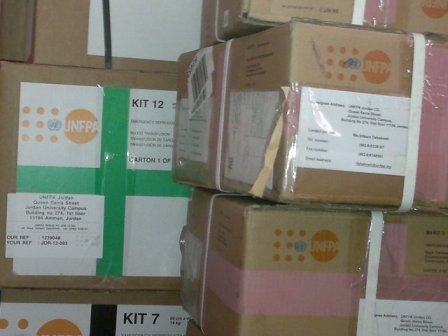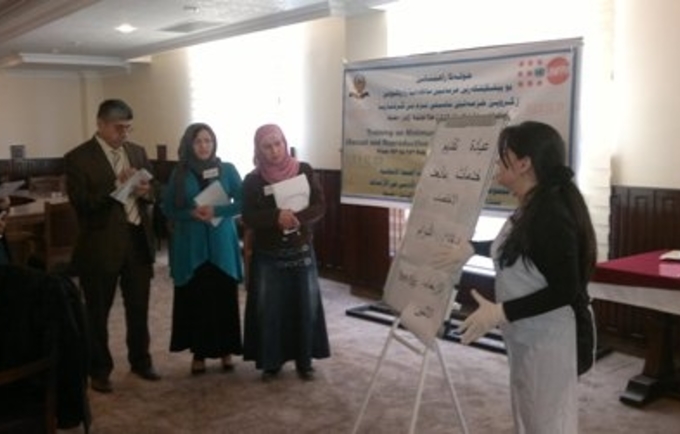As part of its mission to support “delivering a world where every pregnancy is wanted, every childbirth is safe, and every young person’s positional is fulfilled”, and since the early days of the crisis in Syria UNFPA aimed at supporting the enhancement of Reproductive Health (RH) services for the Syrian Refugees in the North of Iraq though three main strategies:
- Ensure accessibility of affected people to RH services and information including the emergency obstetric care through: a) deployment of staff to health facilities; b) procurement and delivery of RH commodities and pharmaceutical supplies, medical equipment and dignity kits;
- Ensure accessibility of Syrian women and young girls (hosted in Refugee camps, as well those within hosting communities), in general, with particular focus on Gender based Violence (GBV) survivors, to GBV Information and Psycho-Social Support and First Aid;
- Facilitate sensitization and mobilization of Syrian youth (male and female), hosted in Refugee camps, as well those within hosting communities, on issues related to SRH, violence and GBV.
To achieve the above UNFPA managed and in cooperation with the Department of Health (DoH) in Duhok, to establish an RH clinic within the Primary Health Care Center inside Domiz Camp in Duhok in February 2013. UNFPA is supporting the provision of this clinic with staff (one gynecologist and four nurses and midwives), equipment, and drug supplies. Moreover, and in cooperation with all involved UN agencies and NGOs a special space was established within this clinic for women and young girls to gather and discuss issues related to their RH and GBV issues they are facing inside the camp. A committee was formed from the camp management to facilitate such gatherings that shall allow UNFAP and partners to better tackle issues that refuges are facing.

In addition, RH kits were delivered by UNFPA to the DoH to serve the reproductive health needs of all refugees (estimated around 80,000 refugees) residing in the camp and those integrated within local communities. These kits include:
- Two Kits (11 A&B) for Duhok Central Hospital to support 150 C-section deliveries
- Two male Condom Kits (1A) to serve the population of the camp residents
- Five Clean Delivery Kits (2A) to be distributed for all visibly pregnant women
- Five Kits (3) to cover the potential needs of survivors of Sexual and GBV inside the camp
- Eight Kits (4) Oral and Injectable Contraceptives to cover the needs of the 20,000 women in reproductive age
- Eight Kits (5) for the treatment of Sexually Transmitted Infections (STIs)
- Eight Clinical Delivery Assistance Kit (6 A&B) for serving 2,400 potential normal deliveries (for the refugees and for the hosting community)
- Two Kits (8) for managing complications of miscarriage
- Two Kit (12) to perform safe blood transfusion to serve the needs of the refugees as well as the local community
UNFPA also with partnership of International Rescue Committee (IRC) and DoH managed to conduct the Minimum Initial Service Package (MISP) training. Twenty one trainees from the different stakeholders including DoH staff, NGOs and INGOs in Duhok have benefited from the training that aimed atproviding the minimum services during emergency including: RH services provision and the coordination mechanisms to prevents GBV and to assist GBV survivors, to prevents the spread of HIV/AIDS and other STIs, to reduces maternal mortality and morbidity among women, and to pave the road for plans to provide comprehensive RH servicesto be integrated within the primary health care.

